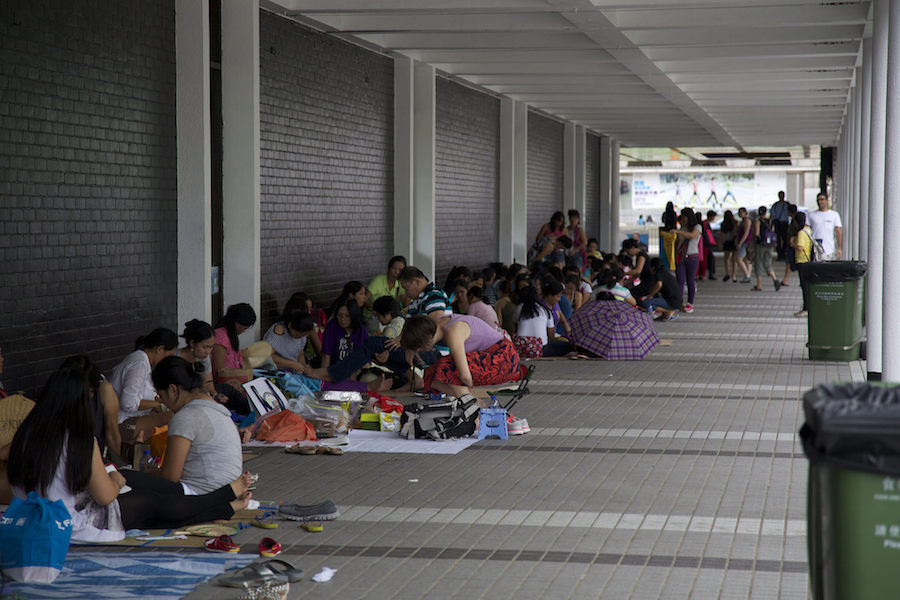The often “invisible” labor of migrant domestic workers contributed billions of dollars to Hong Kong’s economy last year, equivalent to 3.6 percent of the city’s GDP, according to a new report.
The report, titled “The Value of Care,” was released yesterday by the Hong Kong charity Enrich and the global financial information company Experian. The study found that migrant domestic workers (MDWs) contributed, both directly and indirectly, HK$98.9 billion (about US$12.6 billion) to the economy in 2018.
“Domestic work is, in many ways, invisible and undervalued work that disproportionately falls on women, often migrants,” Enrich’s executive director, Lucinda Pike, was quoted as saying in a release accompanying the report. “We are thrilled that this research shows how the presence of domestic workers unlocks extra economic potential.”
The report’s authors calculated the economic impact of MDWs based on their direct contributions to the economy, in the form of spending, as well as their indirect contributions, in the form of the “real value” of the childcare and elder care they provide, as well as the economic benefit of the thousands of mothers who are able to participate in the labor force because of them.
The study found that MDWs’ “absolute value” to the economy — the direct contribution half of the equation — amounted to some HK$7.6 billion. The value of the extra time their labor affords other participants in the workforce, meanwhile, comes to a whopping HK$20.1 billion. But the actual value of the services MDWs provide dwarfs both figures, coming in at HK$71.2 billion.
The findings reveal the extent to which domestic labor has become an integral, albeit often overlooked, element of Hong Kong’s society and economy.
For instance, the presence of an MDW in a household usually translates to better grades for children in that household because, the authors posit, the services provided by the domestic worker free up time that parents can spend helping their children with schoolwork.

And speaking of children, the cost of childcare as provided by an MDW is practically a steal, saving families as much as 70 percent when compared to other types of early childhood care, like daycares. Over 70 of Hong Kong’s more than 385,000 MDWs are involved in some form of childcare.
On the other end of the age spectrum, MDWs are filling an increasingly crucial role in caring for the city’s elderly. Some 40 percent of MDWs are involved in some form of elder care, demand for which is expected to nearly double by 2030 as Hong Kong’s population ages.
But the group deriving perhaps the greatest economic benefits from MDWs is mothers. According to the study, labour force participation is 30 percent higher among mothers who employ domestic workers than it is among those who don’t have the benefit of extra help at home. Another study cited by report found that 29 percent of working mothers would quit their jobs if they didn’t have an MDW.
However, one group that isn’t fully sharing in the benefits of Hong Kong MDW boom is the workers themselves. More than 80 percent of MDWs in Hong Kong are in debt, though many of the debts were preexisting.
Compounding the problem is the fact that only 18 percent of Hong Kong MDWs have bank accounts, and find it difficult to access formal financial services. That means when they do need to borrow, say in the event of a family emergency, they turn “turned to employers or agencies, who charge high interest rates (up to 120%), keeping MDWs trapped in the cycle of debt.”

And for all the benefits they provide, domestic workers can find their position in Hong Kong very precarious, as evidenced by the recent case of a Filipino woman who was fired for being diagnosed with cancer.
The report goes on to call for greater emphasis on financial literacy among MDWs, and for destination cities like Hong Kong to implement policies that make it easier for workers to access formal financial institutions as an “immediate step in ensuring that there is a mutually beneficial relationship between migrant domestic workers and their destination cities.”
Correction: A previous version of this story incorrectly characterized Enrich as an advocacy group. In fact, the organization is a charity. Coconuts HK apologizes for any confusion caused.




